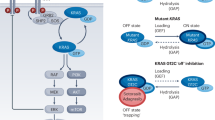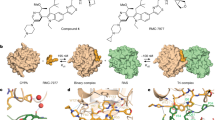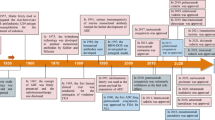Abstract
The recent successful development of monoclonal antibodies that target key components of biological pathways has expanded the armamentarium of treatment options for patients with colorectal cancer (CRC). In particular, the epidermal growth factor receptor (EGFR), a tyrosine kinase growth factor receptor involved in CRC development and progression, is exploited by the newest monoclonal antibody that is available for use in CRC patients. Cetuximab, the first chimeric monoclonal antibody, which has been generated against the EGFR, is currently registered in USA, Europe and worldwide, in combination with irinotecan in the treatment of metastatic CRC patients who have progressed on irinotecan containing chemotherapy. Cetuximab is well tolerated and does not exacerbate the toxicity of concomitant chemotherapy. Furthermore, a series of phase III clinical trials are currently evaluating the combination of cetuximab with standard chemotherapy regimens in the first-line treatment chemotherapy-naïve patients with metastatic CRC.
This is a preview of subscription content, access via your institution
Access options
Subscribe to this journal
Receive 50 print issues and online access
$259.00 per year
only $5.18 per issue
Buy this article
- Purchase on Springer Link
- Instant access to full article PDF
Prices may be subject to local taxes which are calculated during checkout
Similar content being viewed by others
References
Abubakr Y, Eng C, Pautret V, Maurel J, Scheithauer W, Kroening H et al. (2006). Cetuximab plus irinotecan for metastatic colorectal cancer (mCRC): safety analysis of 800 patients in a randomized phase III trial (EPIC). J Clin Oncol. ASCO Annual Meeting Proceedings Part I. Vol 24, No. 18S (June 20 Supplement): 3556.
Akimoto T, Hunter NR, Buchmiller L, Mason K, Ang KK, Milas L . (1999). Inverse relationship between epidermal growth factor receptor expression and radiocurability of murine carcinomas. Clin Cancer Res 5: 2884–2890.
Arteaga CL . (2001). The epidermal growth factor receptor: from mutant oncogene in nonhuman cancers to therapeutic target in human neoplasia. J Clin Oncol 19: 32–40.
Badarinath SME, Jennis A . (2004). Cetuximab plus FOLFOX for colorectal (EXPLORE): preliminary safety analysis of a randomized phase III trial. Presented at the 2004 American Society of Clinical Oncology Annual Meeting New Orleans, Louisiana.
Barber TD, Vogelstein B, Kingzler KW, Velculescu VE . (2004). Somatic mutations of EGFR in colorectal cancer and glioblastomas. New Engl J Med 351: 2883.
Baselga J, Pfister D, Cooper MR, Cohen R, Burtness B, Bos M et al. (2000). Phase I studies of antiepidermal growth factor receptor chimeric antibody C225 alone and in combination with cisplatin. J Clin Oncol 18: 904–914.
Bianco C, Bianco R, Tortora G, Damiano V, Guerrieri P, Montemaggi P et al. (2000). Antitumor activity of combined treatment of human cancer cells with ionizing radiations and anti-epidermal growth factor receptor monoclonal antibody C225 plus type I protein kinase A antisense oligonucleotide. Clin Cancer Res 6: 4343–4350.
Braun AH, Achterrath W, Wilke H, Vanhoefer U, Harstrick A, Preusser P . (2004). New systemic frontline treatment for metastatic colorectal carcinoma. Cancer 100: 1558–1577.
Bruns CJ, Harbison MT, Davis DW, Portera CA, Tsan R, McConkey DJ et al. (2000). Epidermal growth factor receptor blockade with C225 plus gemcitabine results in regression of human pancreatic carcinoma growing orthotopically in nude mice by antiangiogenic mechanisms. Clin Cancer Res 6: 1936–1948.
Busam KJ, Capodieci P, Motzer R Kiehn T, Phelan D, Halpern AC . (2001). Cutaneous side effects in cancer patients treated with the antiepidermal growth factor receptor antibody C225. Br J Dermatol 144: 1169–1176.
Ciardiello F, Bianco R, Damiano V, De Lorenzo S, Pepe S, De Placido S et al. (1999). Antitumor activity of sequential treatment with topotecan and anti-epidermal growth factor receptor monoclonal antibody C225. Clin Cancer Res 5: 909–916.
Ciardiello F, Bianco R, Damiano V, Fontanini G, Caputo R, Pomatico G et al. (2000). Antiangiogenic and antitumor activity of anti-epidermal growth factor receptor C225 monoclonal antibody in combination with vascular endothelial growth factor antisense oligonucleotide in human GEO colon cancer cells. Clin Cancer Res 6: 3739–3747.
Ciardiello F, Tortora G . (2001). A novel approach in the treatment of cancer: targeting the epidermal growth factor receptor. Clin Cancer Res 7: 2958–2970.
Ciardiello F, Tortora G . (2002). Anti-epidermal growth receptor drugs in cancer therapy. Expert Opin Investig Drugs 11: 755–768.
Cohen RB, Falcey JW, Paulter WJ, Fetzer KM, Waksal HW . (2000). Safety profile of the monoclonal antibody IMC-C225, an anti-epidermal growth factor receptor (EGFR) used in the treatment of EGFR- positive tumors. Proc Am Soc Clin Oncol 19: Abs 1862.
Cunningham D, Humblet Y, Siena S, Khayat D, Bleiberg H, Santoro A et al. (2004). A randomized comparison of cetuximab monotherapy and cetuximab plus irinotecan in irino-tecan-refractory metastatic colorectal cancer. N Engl J Med 351: 337–345.
Debaldo C, Pierga JY, Dieras V . (2003). Evaluation of the pharmacokinetic (PK) interactions between cetuximab and irinotecan in patients with epidermal growth factor receptor (EGFR)-expressing advanced solid tumors. Results of phase I study. Eur J Cancer, (Suppl 1);Abstract 552.
Folprecht G, Lutz MP, Schoeffski P, Seufferlein C, Nolting A, Pollert P et al. (2005). Cetuximab and irinotecan/5-fluorouracil/folinic acid is a safe combination for the first-line treatment of patients with epidermal growth factor receptor expressing metastatic colorectal carcinoma. Ann Oncol 17: 450–456.
Galizia G, Lieto E, Ferraraccio F, De Vita F, Castellano P, Orditura M et al. (2006). Prognostic significance of epidermal growth factor receptor expression in colon cancer patients undergoing curative surgery. Ann Surg Oncol 13: 823–835.
Grunwald V, Hidalgo M . (2003). Developing inhibitors of the epidermal growth factor receptor for cancer treatment. J Natl Cancer Inst 95: 851–867.
Herbst RS, Shin DM . (2002). Monoclonal antibodies to target epidermal growth factor receptor positive tumours: a new paradigm for cancer therapy. Cancer 94: 1593–1611.
Hohler T . (2004). Phase I/II study of cetuximab combined with 5-fluorouracil/ leucovorin plus weekly oxaliplatin in first-line treatment of epidermal growth factor receptor-expressing metastatic colorectal cancer. Presented at the European Society of Medical Oncology Congress, Vienna, Austria 29–November 2.
Holliwood E . (2002). Clinical issues in the administration of an anti-epidermal growth factor receptor monoclonal antibody, IMC-C225. Semin Oncol Nurs 18: 30–35.
Huang SM, Bock JM, Harari PM . (1999). Epidermal growth factor receptor blockade with C225 modulates proliferation, apoptosis, and radiosensitivity in squamous cell carcinomas of the head and neck. Cancer Res 15: 1935–1940.
Huang SM, Harari P . (2000). Modulation of radiation response after epidermal growth factor receptor blockade in squamous cell carcinomas: inhibition of damage repair, cell cycle kinetics, and tumor angiogenesis. Clin Cancer Res 6: 2166–2174.
Humblet Y . (2004). Cetuximab: an IgG1 monoclonal antibody for the treatment of epidermal growth factor receptor expressing tumours. Expert Opin Pharmacother 5: 1621–1633.
Inoue K, Slaton JW, Perrotte P, Davis DW, Bruns CJ, Hicklin DJ et al. (2000). Paclitaxel enhances the effects of the anti-epidermal growth factor receptor monoclonal antibody ImClone C225 in mice with metastatic human bladder transitional cell carcinoma. Clin Cancer Res 6: 4874–4884.
Kim ES, Khuri FR, Herbst RS . (2001). Epidermal growth factor receptor biology (IMC-C225). Curr Opin Oncol 13: 506–513.
Lee E, Hoff PM . (2004). Targeting the epidermal growth factor receptor: an important incremental step in the battle against colorectal cancer. J Clin Oncol 22: 1177–1179.
Lynch TJ, Bell DW, Sordella R, Gurubhagavatula S, Okimoto RA, Brannigan W et al. (2004). Activating mutations in the epidermal growth factor receptor underlying responsiveness of non-small-cell lung cancer to gefitinib. N Engl J Med 350: 2129–2139.
McClelland RA, Barrow D, Madden TA Butkowski CM, Pamment J, Knowlden JM et al. (2001). Enhanced epidermal growth factor receptor signaling in MCF7 breast cancer cells after long-term culture in the presence of the pure antiestrogen ICI 182,780 (Faslodex). Endocrinology 142: 2776–2788.
Mendelsohn J . (2000). Blockade of receptors for growth factors: an anticancer therapy. Clin Cancer Res 6: 747–753.
Mendelsohn J . (2001). The epidermal growth factor receptor as a target for cancer therapy. Endocrine Related Cancer 8: 3–9.
Mendelsohn J, Baselga J . (2003). Status of epidermal growth factor receptor antagonists in the biology and treatment of cancer. J Clin Oncol 21: 2787–2799.
Milas L, Mason K, Hunter N, Peterson S, Yamakawa M, Ang K ;et al. (2000). In vivo enhancement of tumor radioresponse by C225 antiepidermal growth factor receptor antibody. Clin Cancer Res 6: 701–708.
Olayioye MA, Neve RM, Lane HA, Hynes NE . (2001). The ErbB signaling network: receptor heterodimerization in development and cancer. EMBO J 19: 3159–3167.
Peng D, Fan Z, Lu Y, Deblasio T, Scher H, Mendelsohn J . (1996). Anti-epidermal growth factor receptor monoclonal antibody C225 upregulates p27kip1 and induces G1 arrest in prostatic cancer cell line DU145. Cancer Res 56: 3666–3669.
Perrotte P, Matsumoto T, Inoue K, Kuniyasu H, Eve BY, Hicklin DJ et al. (1999). Anti-epidermal growth factor receptor antibody C225 inhibits angiogenesis in human transitional cell carcinoma growing orthotopically in nude mice. Clin Cancer Res 5: 257–265.
Prewett MC, Hooper AT, Bassi R, Ellis LM, Waksal HW, Hicklin DJ . (2002). Enhanced antitumor activity of anti-epidermal growth factor receptor monoclonal antibody IMC-C225 in combination with irinotecan (CPT-11) against human colorectal cancer xenografts. Clin Cancer Res 8: 994–1003.
Robert F, Ezekiel MP, Spencer SA, Meredith RF, Bonner JA, Khazaeli MB et al. (2001). Phase I study of antiepidermal growth factor receptor antibody cetuximab in combination with radiation therapy in patients with advanced head and neck cancer. J Clin Oncol 19: 3234–3243.
Rosemberg AH, Loeherer PJ, Needle MN, Waksal H, Hollywood E, Ramos L et al. (2002). Erbitux (IMC-C225) plus weekly irinotecan (CPT-11), fluorouracil (5-FU) and leucovorin (LV) in colorectal cancer (CRC) that express the epidermal growth factor receptor (EGFR). Proc Am Soc Clin Oncol Abs 536.
Saleh MH, Raisch KP, Stackhouse MA, Grizzle WE, Bonner JA, Mayo MS et al. (1999). Combined modality therapy of A431 human epidermoid cancer using anti-EGFr antibody C225 and radiation. Cancer Biother Radiopharm 14: 451–463.
Salomon DS, Brandt R, Ciardiello F, Normanno N . (1995). Epidermal growth factor-related peptides and their receptors in human malignancies. Crit Rev Oncol Haematol 19: 183–232.
Salomon DS, Gullick W . (2001). The erbB family of receptors and their ligands: multiple targets for therapy. Signal 2: 4–11.
Saltz L, Kies M, Abbruzzese JL, Azarnia N, Needle M. . (2003). The presence and intensity of the cetuximab-induced acne-like rash predicts increased survival in studies across multiple malignancies. Proc Am Soc Clin Oncol 22: Abs 817.
Saltz L, Lenz H, Kindler H, Hochster H, Wadler S, Hoff P et al. (2005). Interim report of randomized phase II trial of cetuximab/bevacizumab/irinotecan (CBI) versus cetuximab/irinotecan (CB) in irinotecan-refractory colorectal cancer. Presented at the American Society of Clinical Oncology Gastrointestinal Symposium, Hollywood, FL, January 27–29.
Saltz L, Meropol NJ, Loeher PJ, Needle MN, Kopit J, Mayer RJ . (2004). Phase II trial of cetuximab in patients with refractory colorectal cancer that express the epidermal growth factor receptor. J Clin Oncol 22: 1201–1208.
Saltz L, Rubin M, Hochster H, Hochster H, Wadler S, Hoff P et al. (2001). Cetuximab (IMC-C225) plus irinotecan (CPT-11) is active in CPT-11-refractory colorectal cancer (CRC) that expresses epidermal growth factor receptor (EGFR). Proc Am Soc Clin Oncol 20: Abst 7.
Wosikowski K, Schuuruis D, Kops GJPL, Saceda M, Bates SE . (1997). Altered gene expression in drug-resistant human breast cancer cells. Clin Cancer Res 3: 2405–2414.
Wu X, Rubin M, Fan Z, DeBlasio T, Soos T, Koff A et al. (1996). Involvement of p27kip1 in G1 arrest mediated by an anti-epidermal growth factor receptor monoclonal antibody. Oncogene 12: 1397–1403.
Yarden Y, Sliwkowski MX . (2001). Untantling the ErbB signalling network. Nat Rev Mol Cell Biol 2: 127–137.
Author information
Authors and Affiliations
Corresponding author
Rights and permissions
About this article
Cite this article
Galizia, G., Lieto, E., De Vita, F. et al. Cetuximab, a chimeric human mouse anti-epidermal growth factor receptor monoclonal antibody, in the treatment of human colorectal cancer. Oncogene 26, 3654–3660 (2007). https://doi.org/10.1038/sj.onc.1210381
Published:
Issue Date:
DOI: https://doi.org/10.1038/sj.onc.1210381
Keywords
This article is cited by
-
Mechanistic Modeling of the Effect of Recombinant Human Hyaluronidase (rHuPH20) on Subcutaneous Delivery of Cetuximab in Rats
Pharmaceutical Research (2022)
-
Role of thyroid hormone-integrin αvβ3-signal and therapeutic strategies in colorectal cancers
Journal of Biomedical Science (2021)
-
Receptor tyrosine kinase-dependent PI3K activation is an escape mechanism to vertical suppression of the EGFR/RAS/MAPK pathway in KRAS-mutated human colorectal cancer cell lines
Journal of Experimental & Clinical Cancer Research (2019)
-
Counting growth factors in single cells with infrared quantum dots to measure discrete stimulation distributions
Nature Communications (2019)
-
Expression, purification, and characterization of the native intracellular domain of human epidermal growth factor receptors 1 and 2 in Escherichia coli
Applied Microbiology and Biotechnology (2019)



